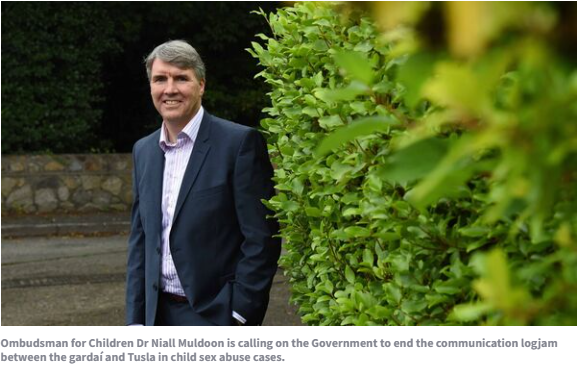Irish Examiner, May 8th 2023.
The Ombudsman for Children tells Security Correspondent Cormac O’Keeffe it’s time the Government ends the communication logjam between the gardaí and Tusla in child sex abuse cases.
Children’s ombudsman Dr Niall Muldoon is baffled.
Some six years ago he looked into why the gardaí and Tusla were not sharing information on child sex abuse cases. He could find no legal reason for it.
The Government at the time indicated it was down to practice that had built up.
Two years later it appeared the problem was no more when the government opened up a centre where the agencies would physically work together and provide all the services to children affected.
Now, four years on, Dr Muldoon reads the agencies are still not sharing information and that the children continue to suffer the consequences in terms of investigation delays and therapy.
The revelation, which he describes as “very disappointing”, comes in a joint report by the EU and the Council of Europe into Ireland’s implementation of the ‘Barnahus’ model.
Under this system, which originated in Iceland, all the services — medical forensic examiners, social workers, police and therapists — operate under the one roof and in the best interests of the child.
Ireland started a pilot in September 2019, based in Galway, which began taking referrals in November 2020.
The EU-CoE ‘Inception Report’ said there were “undue delays” in child victims accessing justice in Ireland, noting that staff in Barnahus West estimated that children were waiting between two and nine years for a court date.
Dr Muldoon told researchers for the report that children were subject to “multiple interviews” by different agencies during the gathering of evidence because there was no clear approach by them and that this had the potential to be “traumatising” and created “huge delays”.
The report found that different agencies had “differing and even opposing views” on the functioning of the Barnahus model.
It said that the position being taken by the agencies on sharing information had “little focus on the best interests of the child” and that there was a need for a national policy “requiring and defining” interagency cooperation.
In an interview with the , Dr Muldoon said he did not know what the problem was.
“This is what is baffling me,” he said. “I and Professor Geoffrey Shannon [the then government rapporteur for children] were involved in 2017 — after his report into Garda child protection.
“In the report, he said there was superficial and ineffective communication at times between gardaí and Tulsa.”
A major report by the Garda Inspectorate, Responding to Child Sexual Abuse, also published in 2017, highlighted repeatedly the problem of information not being shared.
It said: “The requirements of freedom of information and data protection appear to have contributed to a very cautious approach to the sharing of information.”
Staff from the agencies told the inspectorate that information-sharing blockages could happen in complex cases.
In two examples provided, gardaí were told that they should apply for a search warrant to obtain information relating to a complex investigation.
Other concerns raised were in relation to the disclosure of information to a partner agency that was then further disclosed by the receiving agency to a third party.
Garda investigators provided examples where information about an investigation was inadvertently disclosed by social workers to persons who were considered potential suspects.
The inspectorate urged the establishment of an information-sharing protocol to address the problem.
After Prof Shannon’s report, Dr Muldoon said both of them linked up with then children’s minister Katherine Zappone and other members of the Department of Justice and visited a number of Barnahus models around Europe and the US.
He said he and his colleague spent six-to-seven months confirming there was no legal impediment for the sharing of child protection information.
“Prof Shannon even said he would write any amendments to legislation, if needed, and was told there was no need to, it was practice, practice had grown up that they [gardaí and Tusla] don’t share,” Dr Muldoon said.
He said he thought the matter was “clarified” finally when Barnahus opened in Galway in September 2019.
“Barnahus was launched by the then minister of justice, minister of children, and a representative of the minister of health, with confirmation that everything was going to run smoothly,” he said. “Yet, we are not there and the Council of Europe is very clear about that.
He said that when he met Justice Minister Helen McEntee last November he was told it was the department’s understanding was that there was “some difficulty” and that a protocol between the services might help.
“I think we need a political impetus to make this happen,” the ombudsman said. “I thought we crossed that Rubicon back in 2019 — that it was already sorted. I think it would be great if Minister Harris or Minister O’Gorman would move forward on that as a matter of urgency.”
The Government plans to open a Barnahus South in Cork by the end of this year, followed by a Barnahus East.
The report said Dublin itself has had “a more robust set of therapy services” — such as St Louise’s Unit in Tallaght Hospital and St Clare’s Unit in Blanchardstown Hospital — before Barnahus in Galway set up and that the new units should not provide a decreased level of service.
Dr Muldoon said England adopted a Barnahus model after a number of scandals there, including one where a large number of children were abused by a group of men. He said some 18 different professionals from different backgrounds knew about the children and if even three of them shared their knowledge they could have responded a lot quicker.
“They now ‘dare to share’,” Dr Muldoon said. “They said they were constantly sued when they failed to share, since they’ve shared no one has sued them, because it is for the right reason, the protection of children.”
When asked what the problem was, a spokesman for the Department of Justice said the Gardaí and Tusla would be “better placed” to comment on the issue of information sharing.
Both Tusla and An Garda Síochána have yet to respond to queries.
On court delays, the justice spokesman Minister Harris announced last February his intention is to appoint an initial tranche of 24 additional judges in 2023 to “facilitate greater access to justice”.
The spokesman said the department was funding a course in University of Limerick to train people as “professional intermediaries” to help sex abuse victims give evidence in court and a pilot scheme was being worked on.
 Ombudsman for Children Dr Niall Muldoon speaking at Child Talks 2021 in the RDS.
Ombudsman for Children Dr Niall Muldoon speaking at Child Talks 2021 in the RDS. Dr Muldoon said it was clear from the report that children “constantly” have to tell their stories to different professionals, delaying not only the evidence-gathering and prosecution process but also therapeutic intervention.
He said “rapid intervention was hugely important” for a child and that delays make it harder to pursue justice in the courts.
“A child who suffered sexual abuse at 10, may be 14 or 15 by the time they are in court and may have changed,” he said. “They may look totally different, have tattoos, may not look vulnerable, may be angry — all sorts of things may have changed, which is why we need to record [their evidence] as it happens and use that as their voice.”
He said there was no national therapeutic service dedicated to children, that was “free and accessible”, and that outside Galway and Dublin, there were limited services.
He cited voluntary group Children at Risk Ireland (CARI), which provides services in Limerick and Dublin and recently opened an outreach centre in Wexford, but continues to battle high demand due to lack of funding.
In contrast, Dr Muldoon said there is a National Counselling Service for adults who are victims of child sex abuse, set up after the institutional abuse scandals.
All of which, he said, underlines the continuing need for a national strategy on combating child sexual abuse, as recommended by the Garda Inspectorate in 2017, and called for by the ISPCC for years.
“I’m not quite sure why we don’t have one,” said Dr Muldoon. “It is one of those issues that, as a nation, has really stained our reputation and our psyche. It’s something we need to get a grasp of.”
A statement from the Department of Children said: “The Barnahus model of service aims to improve children’s experience of the services and avoid re-traumatisation during medical and child protection assessments; evidence gathering and legal proceedings.”
It said the Inception Report was the “first step” of identifying issues among agencies given inter-agency cooperation and the exchange of information was one of the pillars of Barnahus.
“Next steps for the project include an in-depth legal and policy review, which will be commencing soon, and a training gap analysis which is already underway,” it said.

